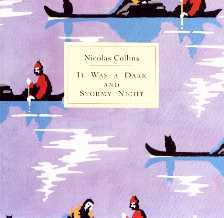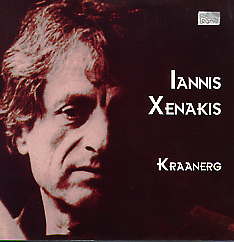But then I'll hear some incredible text composition that works and I'm a believer in the co-existence of words and music again. On the playlist on my portable player at the gym this past week I happened to run through a particularly cool sequence of great text compositions of different stripes:

Nicolas Collins: It Was A Dark And Stormy Night.

I've long had a fondness for this disc. The opening track: "Broken Light" for string quartet accompanied by a modified (skipping) CD-player is an excellent piece filled with all the textures that have me addicted to the Soldier String Quartet. But the text odyssey really begins with the final track that fills the final half hour of this disc.
"It Was A Dark And Stormy Night" is scored for a wide range of "downtown" performers (including the much missed Tom Cora on cello) and a series of voices that tell a cyclical series of stories that begin with the phrase: "It was a dark and stormy night...." The text, and much of the audio content, dwells on the theme of copies, forgeries, derivative ideas and imitation. Amazingly, this piece never collapses under its own self-referentiality. As a composer and electronic musician, Nicolas Collins has a wonderfully subversive streak. The climax of this piece is when he turns David Moss loose with one of his insane vocal improvisations that randomly quotes portions of all the stories told so far. Like much of Collins' music, the concepts seem susceptible to gimmick yet never fall in that direction.
Then the playlist turned toward something completely different....

Johnny Cash: The Essential Johnny Cash.

My ears took one of those rare, choice-driven turns toward a commercially viable genre (the extremely rare subgenre of Country Music even). This music would seem to violate all my "anarchist" sensibilities and yet the quality of Cash's voice and delivery along with the outstanding quality of lyrics and story telling win me over every time.
"The Ballad of Ira Hayes" is timeless and deeply moving. And always an important story to remember whenever greed sends the young and poor off to fight wars. I also dig the whimsy of "One Piece At A Time" or the sentiment of "Man In Black." Much of these recordings are such a great example of what song can be and what pure charisma can bring to the troubadour art.

Steve Reich/Alarm Will Sound: Tehillim/The Desert Music.

The Standing Room sends word of a certain Mademoiselle T who can sing the entire theme from part I of "Tehillim" from memory from having learned it from a recording. Damn! I hope she's available for parties.
"Tehillim" is a great piece and this particular performance is outstanding. And it also serves as another angle on the successful text composition. The Psalms are a rich source for musical setting and I love the combination of voice and percussion.
"The Desert Music" used to be an all time favorite composition for me. I'm deeply familiar with the orchestral version conducted by Michael Tilson Thomas. This revised chamber version falls short for me. The voices seem too exposed in the smaller setting and the delivery style feels off to me. The grand, sweeping message for humanity in the William Carlos Williams poetry seems to beg for a larger ensemble sound. The harmonic progression is fantastic and a major draw for my ears.

Iannis Xenakis: Kraanerg.

After all those hours of text music it was time to retreat in a refreshing bath of European avant garde aggressive dissonance the way Iannis Xenakis' instrumental works can deliver it. Ahhh... now that's refreshing listening.


No comments:
Post a Comment